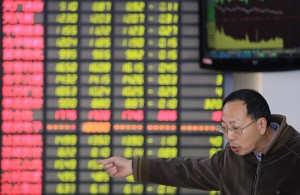Asian shares rise despite weak China data
HONG KONG—Asian markets climbed Monday as investors brushed off fresh evidence indicating that China’s manufacturing sector is shrinking, while some analysts said it could prompt lawmakers to loosen monetary policy.
Japanese shares enjoyed a healthy rebound following a heavy sell-off on Thursday, buoyed by the yen’s losses against the dollar, although investors remain on edge over the Crimea crisis.
Tokyo gained 1.77 percent, or 251.07 points, to end at 14,475.30, Sydney rose 0.17 percent, or 8.8 points, to 5,346.9 and Seoul closed 0.55 percent higher, adding 10.61 points to 1,945.55.
Shanghai closed up 0.91 percent, or 18.66 points, at 2,066.28 while Hong Kong rallied 1.91 percent, or 409.75 points, to 21,846.45.
HSBC said preliminary readings showed Chinese factory activity had contracted in March, adding to concerns about the world’s No. 2 economy.
The British banking giant’s flash purchasing managers index came in at 48.1, an eight-month low and down from 48.5 in February. A final figure will be released next week.
Anything below 50 indicates contraction, while a figure above points to expansion.
“China’s growth momentum continued to slow down,” HSBC economist Qu Hongbin said in a statement. “Weakness is broadly based with domestic demand softening further. We expect Beijing to launch a series of policy measures to stabilize growth.”
The figures are the latest to suggest the Chinese economy, a key driver of regional and global growth, is slowing down following several months of weak data including on trade, investment and inflation.
But, despite the downbeat results, regional markets were broadly buoyant, with some analysts suggesting policymakers could start to loosen their grip on monetary policy to grease the economy.
“With growth poised to slow below 7.5 percent year-over-year, we are now in easing territory for both fiscal and monetary policy,” Flemming Nielsen, a senior analyst at Danske Bank in Denmark, said.
Japan’s Nikkei surged on bargain-hunting following a 1.65 percent dive on Thursday. The market was closed Friday for a public holiday.
Providing support to Tokyo shares was a weaker yen, which helps exporters. In afternoon trade, the dollar bought 102.61 yen, compared with 102.23 yen in New York Friday.
The euro fetched $1.3817 against $1.3794 and 141.80 yen from 141.87 yen.
Obama heads to Europe, Russia on agenda
Wall Street provided a negative lead, with US investors on edge over events in eastern Europe after Russia absorbed Crimea from Ukraine following a controversial referendum earlier in the month.
The Dow fell 0.17 percent, the S&P 500 lost 0.29 percent and the Nasdaq shed 0.98 percent.
Markets are keeping an eye on Europe as US President Barack Obama—who has led stiff Western sanctions against Moscow—heads to The Hague for a gathering of world leaders that could see Russia excluded from the Group of Eight rich countries.
With Russia massing what NATO called a “very sizeable” force on its border with Ukraine, there are fears that President Vladimir Putin is hungry for more Ukrainian territory.
In oil trade, New York’s main contract, West Texas Intermediate for May delivery, rose seven cents to $99.53 a barrel in afternoon trade, and Brent crude for May dipped 29 cents to $106.63.
Gold fetched $1,322.65 an ounce at 0810 GMT compared with $1,341.57 late Friday.
In other markets:
— Taipei rose 0.33 percent, or 28.21 points, to 8,605.38.
Taiwan Semiconductor Manufacturing Co. was unchanged at Tw$112.5 while Hon Hai Precision rose 1.53 percent to Tw$86.0.
— Wellington eased 0.12 percent, or 6.38 points, to 5,118.62.
Telecom was up 1.26 percent at NZ$2.40 but Fletcher Building fell 1.84 percent to NZ$9.59.
— Manila climbed 0.97 percent, or 61.41 points, to 6,400.67.
BDO Unibank gained 1.34 percent to 83.10 pesos and Philippine Long Distance Telephone rose 1.04 percent to 2,708 pesos.
— Mumbai surged 1.38 percent, or 300.16 points, to 22,055.48.
Engineers India rose 6.73 percent or 12.60 rupees to 199.95 rupees per share, while Muthoot Finance rose 5.16 percent or 8.15 rupees to 166.20 rupees per share.
— Bangkok lost 0.78 percent, or 10.60 points, to 1,349.90.
Airports of Thailand dropped 2.34 percent to 188 baht, while telecoms company True Corporation fell 2.17 percent to 6.75 baht.
— Jakarta ended up 0.43 percent, or 20.21 points, at 4,720.42.
Tin producer Timah gained 5.43 percent to 1,845 rupiah, while lender Bank Permata fell 1.85 percent to 1,330 rupiah.
— Singapore closed up 1.25 percent, or 38.44 points, at 3,111.83.
Singapore Telecommunications rose 1.14 percent to Sg$3.56 while DBS bank was also up 1.52 percent to Sg$16.07.
— Kuala Lumpur’s main stock index gained 0.73 percent or 13.37 points to 1,833.85.
British American Tobacco ended 2.4 percent higher at 59.88 ringgit, while YTL was up 2.0 percent to 1.55. Top Glove fell 4.1 percent to 4.88 ringgit.
Originally posted: 4:08 pm | Monday, March 24th, 2014
RELATED STORIES
